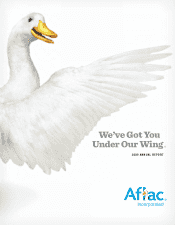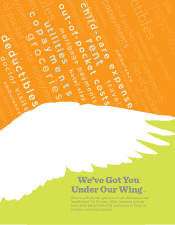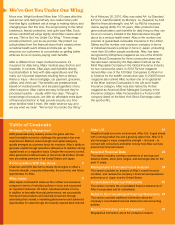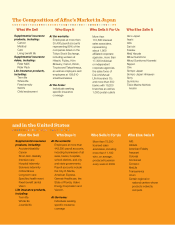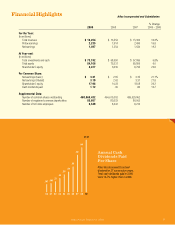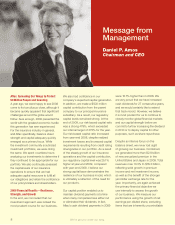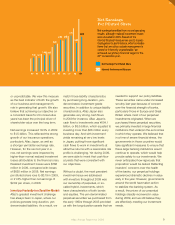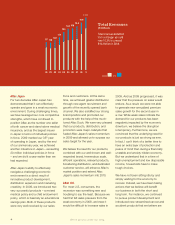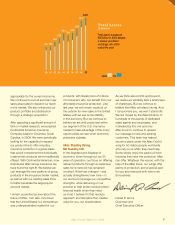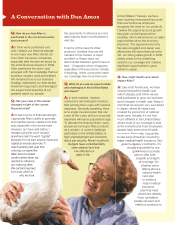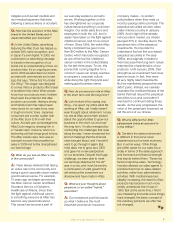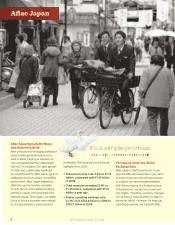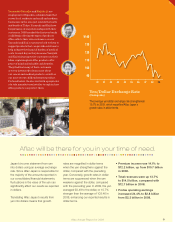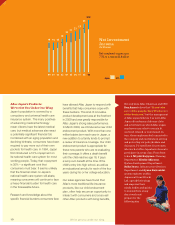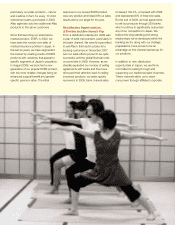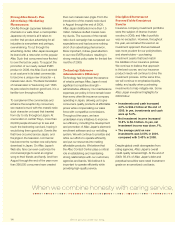Aflac 2009 Annual Report Download - page 10
Download and view the complete annual report
Please find page 10 of the 2009 Aflac annual report below. You can navigate through the pages in the report by either clicking on the pages listed below, or by using the keyword search tool below to find specific information within the annual report.
A Conversation with Dan Amos
Q: How do you feel Afl ac is
positioned in the current economic
environment?
A: I think we’re positioned very
well. I believe our nancial strength
is one major way A ac stands out
from other insurance companies,
especially after the test we faced, by
the entire nancial industry in 2009.
A ac weathered the storm, and
emerged with the knowledge that our
business model is solid and resilient.
We remained true to our business
strategy, maintained our time-tested
investment approach, and leveraged
the support and expertise of our
greatest asset: our people.
Q: Has your view of the market
changed in light of the current
fi nancial crisis?
A: It has in terms of nancial strength.
I appreciate A ac’s ability to generate
and maintain excess capital more than
ever, especially in this environment.
However, as I have said before, I
hesitate using the word “excess”
anywhere near the word “capital”
because I’m not sure anyone views any
capital as excess anymore. It
was frustrating last year that
a strong company like
A ac faced a closed
credit market when we
wanted to re nance
our maturing debt.
We certainly learned
from that, which is
why we took
United States. However, we have
been opening more payroll accounts
than ever before as employers
recognize the need for our products.
I believe this payroll account growth
has given us shelf space at the
worksite, which will enhance our sales
opportunities when the economy
improves. The Japanese economy
has also struggled and Japan was
affected by the same nancial crisis.
Yet, our strong sales growth in 2009
clearly points to the underlying
need for our coverage and I believe
signi cant opportunities to grow
remain in Japan.
Q: How might health care reform
impact Afl ac?
A: Like most Americans, we have
closely followed the health care
reform debate, and I think we are
well-positioned to grow our business
amid changes in health care. Keep in
mind that we’ve been very successful
in Japan, where all citizens are
covered by some form of national
heath care. Actually, it’s not that
much different in the United States
where most of our coverage is sold
at the worksite and most employees
already have some kind of health
insurance. Personally, I would like
to see every American covered by
major medical health insurance. But,
given budgetary constraints, it’s
virtually impossible for any
government or private
plan to offer both
breadth and depth
of coverage. So
whether we’re
talking about a
national health
care plan
or simply a
major medical
insurance
plan that most
Americans already
have, we believe
people will want and
need our products to
the opportunity to re nance our next
debt maturity seven months before it
was due.
In terms of the need for A ac
products, I believe they are still
needed in this market. A major
accident or illness does not
discriminate between good times or
bad – it happens when it happens,
regardless of the economic climate.
If anything, I think consumers need
our coverage now more than ever.
Q: What do you see as opportunities
and challenges in the United States
and Japan?
A: In both markets, I believe
consumers are looking for solutions
that will help them cope with medical
expenses. Generally speaking, there
is no single insurance plan that can
cover all the costs, and out-of-pocket
expenses will rise as populations age.
To alleviate the nancial strain, many
people are turning to A ac products
as a solution. A current challenge,
particularly in the United States, is
high unemployment and concerns
about job security. Many household
budgets have understandably
been slashed and that
has affected our
sales in the
anywhere near the word “capital”
because I’m not sure anyone views any
capital as excess anymore. It
was frustrating last year that
a strong company like
A ac faced a closed
credit market when we
wanted to re nance
our maturing debt.
We certainly learned
from that, which is
why we took
insurance. Personally, I would like
to see every American covered by
major medical health insurance. But,
given budgetary constraints, it’s
virtually impossible for any
government or private
plan to offer both
breadth and depth
of coverage. So
Americans already
have, we believe
people will want and
need our products to
particularly in the United States, is
high unemployment and concerns
about job security. Many household
budgets have understandably
been slashed and that
has affected our
sales in the
6

